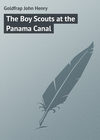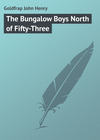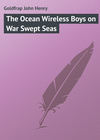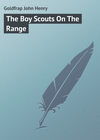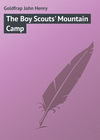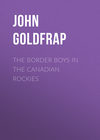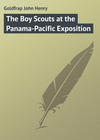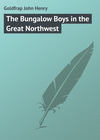Buch lesen: «The Boy Scouts at the Panama Canal», Seite 9
CHAPTER XXIV
THE TRACKLESS JUNGLE
As they slowly ascended the sluggish, though powerful current of the muddy Chagres, Mr. Raynor told them something about the object of their expedition. In the foothills of the Cordillero de Bando, a sort of backbone of mountains extending throughout the length of the Isthmus, many small rivers rise, some of which feed the Chagres and contribute to its floods. The largest of these, a stream known as the Rio Chepalto, was, in the rainy season, quite a formidable torrent. Mr. Mainwaring’s idea was to construct a dam or dig some sort of a connecting link which would divert the waters of the Chepalto in flood time into one of the small rivers that flowed seaward, thus further taming the Chagres.
The Gatun valley was soon left behind and the Chagres plunged into a steaming, luxuriant forest. Between banks overgrown in wild profusion with every sort of tropical growth, its chocolate colored current flowed silently along. In places, muddy bayous led off from the main stream and these, the boys were told, were the haunts of crocodiles and alligators.
Everywhere amidst the luxuriant tangle on the banks were vivid splashes of color, scarlet, yellow, and blue. These were the flowers of a score of varieties of tropic shrubs and flowering bushes. They filled the air with a rank, sweet smell that was almost overpowering. From the tangle, too, there shot up majestic trees, from whose branches drooped long lianas, or creepers, some of them thick as a man’s thigh. Here was a clump of brilliantly green and feathery bamboo, there shot up a grove of coco-bola trees, while once in a while, but this rarely, there loomed in sight a group of the kings of the tropical forests – a majestic gathering of towering mahogany trees.
There were also clumps of banana plants growing to a height of fifteen or twenty feet, with immense broad leaves often six feet in length. Curiously enough, the banana bunches appeared to be hanging upside down. Beyond the fruit extended a stem like a snake, ending in a big blossom something like a red-brown water lily. There were occasional clumps of cocoanut trees, too, at which Tubby looked with a strange mixture of awe and longing.
Occasionally, through all this brilliant jungle gaily colored parrots or a flock of screaming macaws would fly, alarmed by the chugging of the launch. In some of the bayous, pelicans or big blue herons stood like sentinels on one leg, watching the progress of the invaders. But, beautiful as it all was, the boys missed the songs of the woodland birds in the north. Except for the shrieking of the parrots and macaws, or the occasional sullen splash of some unseen creature plunging into the river, the vast forests that reached for miles all about them were silent.
Suddenly the launch came to a stop with a soft bump. The boys looked rather alarmed. Had they collided with some huge creature that made its home in the tepid waters of the Chagres? They were soon relieved of any anxiety on that score.
“Well, we’re aground at last,” remarked Mr. Mainwaring in a matter-of-fact tone.
“You talk as if you had expected such a thing to happen,” said Rob in some surprise.
“Yes indeed,” rejoined the engineer, “in fact, I’m astonished that it didn’t happen before. The river is full of sand banks, and sometimes it is impossible to see the channel. I see you’ve got the engine stopped already. You had better reverse now and we’ll soon get off again.”
“I should think that it would be quicker to go through the forests,” remarked Rob, when without much trouble they “got going” again.
“It would be almost twice as quick, but nobody knows the paths but the Indians.”
“Indians!” exclaimed Tubby. “Are there Indians here?”
He clutched his rifle with a determined look, for of course the boys had brought their weapons along.
“Yes indeed, plenty of them, but I guess we won’t see any. They are the San Blas tribe and so small as to be almost pigmies.”
“I know, I’ve seen pictures of them,” cried Rob. “They look something like Japs only they’ve got big round heads and long, straight black hair.”
“That’s it,” rejoined Mr. Mainwaring; “they’re harmless enough unless their particular territory is invaded. No white man has ever penetrated far into their country and come back to tell the tale. But they say that back among the forests and mountains to which they alone know the way are deposits of emerald and gold of priceless value.”
“I should think somebody would form an expedition and raid the place,” said Tubby in a war-like manner.
“More easily said than done,” Mr. Raynor struck in; “it’s been tried, but fever and poisoned arrows wiped out all but a few poor, half-crazed wretches who struggled back to civilization more dead than alive.”
“Do they ever come down to this part of the country?” asked Merritt.
“Only occasionally, when a hunting expedition has led them far afield,” rejoined Mr. Mainwaring. “This Rio Chepalto that we are going to try to diverge runs back into their country; but where it joins the Chagres is not forbidden ground. Their territory begins higher up.”
Suddenly there came another soft bump.
“Aground again!” cried Rob, stopping the engine. “Shall I reverse?”
“Yes; do so at once,” was the order.
But this time the matter of getting off the sand bank was not so simple. The two tow ropes attached to the canoe became entangled in the paddle wheel as the Pathfinder backed up, and they came to a stop. An investigation showed that it might take some time to get it free. Tubby was prompt in asking permission to go into the forest to see if he couldn’t bring down some game of some kind.
“You and Fred will have to go alone then,” said Mr. Mainwaring, “and don’t go far from the river. We’ll recall you by three blasts on the whistle. Rob and Merritt will be needed to help us get untangled and to work the engine.”
“Never mind, we’ll bring back some game that will make their eyes bulge,” declared Tubby valiantly. “Come on, Fred.”
“Wait till I shove the landing plank ashore,” said Fred, catching hold of a plank that was used for that purpose. The launch lay quite close to the shore and the plank, which was ten feet long, was of sufficient length to form a bridge.
“Never mind the plank,” quoth Tubby, “I’ll just step on this old log here and – ”
“Look out, boy!” came a sharp cry from Mr. Raynor.
But it was too late. Tubby had already stepped over the side of the launch. As his foot touched the log a surprising thing happened. What had seemed a balk of old rotten timber gave a leap that threw Tubby into the water, and at the same instant a vast pair of jaws, armed with double rows of gleaming teeth, flashed wide open. The alligator – for that was what Tubby’s “log” was – gave a menacing, hissing sound and a flourish of its formidable tail.
The next instant a rifle cracked sharply. The creature gave a roar as a bullet crashed down its open throat. Rob, seeing Tubby’s peril, had snatched Fred’s rifle from him and pumped a bullet into the monster reptile where it would do the most good. He pumped the repeating mechanism and two more bullets drove into the ’gator before it sank, crimsoning the muddy water. They saw no more of it and Mr. Mainwaring declared that Rob must have killed it.
Tubby, up to his waist in water, gasped as he beheld his narrow escape and Rob’s prompt action.
“Gee whiz! This is a funny country,” he mumbled, after he had been lectured for his carelessness. “Cocoanuts explode and old rotten logs turn into alligators.”
On his promise to be careful and keep well within call, Tubby was allowed to go on shore with Fred and you may be sure he used the landing plank this time. The two boys struck off straight into the jungle and then kept a course that lay parallel to the river bank. All at once Tubby gave a violent exclamation and almost fell over backward. A lizard, but a lizard almost as big as himself, had run through the jungle right in front of him.
“A Panama water-lizard,” declared Fred, who had put in more time studying the country from books than had Tubby. “It’s harmless.”
“It doesn’t look so,” was Tubby’s comment.
But a more thrilling encounter lay just ahead of them. Hanging from a tree, and slowly swaying to and fro, was what looked like a beautifully marked liana or hanging creeper.
“Oh, what a beauty,” exclaimed Fred, stepping forward, but the next instant he recoiled with a yell of alarm.
The creeper had emitted a loud, angry hiss and then they saw that it was no creeper at all, but a brilliantly colored snake, at least fifteen feet long, that was swinging from a limb around which its tail was coiled. Tubby echoed Fred’s yell of alarm and the next instant both boys took to their heels in mad flight. The serpent had swiftly and silently begun writhing its way to the ground.
“Run for your life!” cried Tubby wildly. “He’s after us.”
Stumbling over creepers, falling headlong, and then struggling to their feet again, and keeping on with their mad rush, the two terrified boys ran for their lives. Behind them came a thrashing sound as the big snake made its way after them.
In their alarm they lost all sense of direction or distance. All they knew was that the big reptile was pursuing them, and they raced along without considering anything but escaping from it. It never even occurred to them to open fire on it with their rifles.
How far they ran they had no idea. All they knew was that at last, when, from sheer exhaustion they paused, there was no sound of pursuit. The vast woods were silent. All at once they had a fresh fright. This time from overhead. There was a mighty commotion in the tree-tops accompanied by shrill barks and cries.
“Gracious, what’s coming now?” gasped Tubby. “I wish we were back on the launch!”
But it was only a troop of white-faced, long-tailed monkeys swinging by, traveling along the tree-top high road at almost incredible speed. They paused as they saw the boys standing there below them. Gathering together they began to chatter and make a terrible noise.
Then, making horrible grimaces and yelling angrily, they broke off sticks and began to pelt the two lads furiously with them. Suddenly Tubby raised his rifle and fired at them. Instantly they made off, shrieking at the top of their voices and swinging from limb to limb by means of their long tails which they used as conveniently as hands.
The monkeys gone with their bewildering chatter, the boys began to look about them. They were standing in a spot where the undergrowth was not so dense, but they could see that they were in the depths of the forest. As they looked around them the same thought clutched uncomfortably hard at the heart of each. How far had they come on their wild run to escape the great serpent? Also, in what direction had their retreat led them? Tubby was the first to give these disquieting thoughts words.
“Where are we, Fred?”
“I – I don’t know. Haven’t you got your compass?”
“Yes, but I didn’t take any bearings when we left the river.”
“Let’s strike out and try to get back. At any rate we’ll hear the whistle before long.”
“That’s so. I forgot that. Better sit down here and wait till we hear it, then. No use wandering about, we might go in a wrong direction.”
But had the boys known it, the launch whistle, not a very powerful one, was at that very minute blowing repeatedly for them. Their wild dash to escape from the huge snake had carried them far into the jungle.
They sat there for a long time, each busied with his own thoughts. At last Tubby rose.
“It’s funny we don’t hear that whistle, Fred,” he said, “but I’ve been thinking that maybe we ran further than we thought from that beast in the tree. Now I’m pretty sure the river lies that way,” he pointed in a directly opposite direction. “Let’s strike out for it.”
“All right,” agreed Fred, whose face had begun to assume an alarmed look. “S-s-s-s-say, Tubby, you don’t think we’re lost, do you?”
Tubby was quick to note the quaver in Fred’s voice, and he bravely put on a careless air.
“Lost! Not a bit of it. Two Boy Scouts lost in a bit of timber like this? Not much. Come on, old chap, and we’ll be laughing over our scare within an hour’s time.”
But hour after hour went by and still the two lads, now thoroughly scared, though neither had yet admitted it, plunged along through the jungle. At last when they reached a small open space, Fred could stand it no longer. He sank down on a fallen tree trunk and fairly gave way to his fears.
“We’re lost, Tubby,” he moaned, “and it’s no use going any further. I can’t, in fact. I’m dead tired out. What on earth shall we do?”
The fat boy looked at his comrade with alarmed eyes. It was plain that Fred was on the verge of a nervous collapse. Their position was bad enough without that. And yet Tubby could find no words to comfort his companion. What Fred had said was the truth; they were lost in the trackless jungle, a terrifying situation indeed. From time to time during their wanderings they had fired their rifles, hoping to hear some response, but none had come.
Tubby, however, had, whenever possible, marked the trail either by barking or blazing a tree with his knife in Indian fashion, or by leaving grass and stone signs in a manner familiar to all first-class Scouts. This was now the only crumb of comfort he could offer to Fred.
“Cheer up. Maybe they’ll pick up the trail,” he said as hopefully as he could.
“But if they don’t, we – gracious! Look there!”
Facing the two lost boys was a party of squat, copper-colored little men with big round heads and straight black hair. They carried bows and arrows and spears. Their clothes consisted of old sacking, bits of cloth, anything in fact that would partially cover them. They evidently formed a hunting party, for some of them carried wild pigs and one or two had a deer slung on a branch between them. They had crept up quite silently and now regarded the interlopers intently.
For an instant the two white boys stood stock-still, as if turned to stone. Then by a natural impulse, they turned and started to run. But a spear whizzed through the air after them, transfixing itself quivering in a tree just above their heads.
This brought them to a halt. Weapons they had none, for when they paused they had laid down their rifles and in their precipitate, startled flight had forgotten to pick them up again.
Utterly unnerved by this added sheaf to their bundle of misfortunes, the two Boy Scouts stood facing the Indians who, they had no doubt, formed a hunting or scouting party sent out by the San Blas tribes that made their homes back in the mysterious recesses of the mountains where rose the headwaters of the Chepalta.
CHAPTER XXV
A CHAPTER OF ACCIDENTS
In the meantime Rob and Merritt, working waist deep in the muddy shallows, had succeeded, after some rather arduous work, in clearing the stern wheel of its entangling rope. The line had become twisted in and out of the shaft in such a way that it was necessary in places to cut it loose.
When this had been done, Mr. Mainwaring decided that before blowing the whistle to summon back the young hunters they would give the machinery a test. Accordingly, when the canoes had been secured to the shore, Rob reversed the engine and started it up.
For a moment it whirled and chugged away, straining to back the launch off the muddy shallows in which she had grounded. The lightly built craft trembled under the effort. The engine snorted and puffed as more power was applied.
“Hooray! We’re afloat once more!” cried Merritt triumphantly, as the launch was caught in the current and swung free. But at the same instant came an ominous cracking sound. The engine raced wildly and then stopped as Rob shut off the power.
“What’s the matter now?” cried Mr. Raynor apprehensively, as the launch began to drift downstream in a helpless way.
“Wait a minute. I’ll see,” cried Rob, and then the next instant, “The driving chain has snapped!”
“Throw out the anchor before we drift any more,” cried Mr. Mainwaring.
This was done and then Rob set about making an investigation. As he had declared, the driving chain, which drove the stern wheel just as a bicycle sprocket is revolved, had parted in the middle. Undoubtedly the strain that had been placed on it when they were backing the launch off had proved too much for its strength.
They regarded the accident with some dismay.
“Great Scotland! That means we are stuck,” exclaimed Merritt.
“Unquestionably, unless we can make some repairs,” admitted Mr. Mainwaring.
“Do you think you can fix it, Rob?” asked Mr. Raynor.
“I might manage to make a temporary link out of wire,” replied Rob, “but I’m afraid it wouldn’t hold long against the current.”
“Isn’t there a spare chain in the tool locker?” asked Merritt.
Mr. Mainwaring shook his head.
“There’s nothing for it but to turn back and get a new link forged,” he said. “Too bad!”
“It is indeed,” agreed Rob. “Shall I make a link out of steel wire? I guess that would be strong enough to carry us down with the stream if we go slowly.”
“Yes, do so,” was the reply. “Merritt, will you sound the return whistle for Bob Hopkins and Fred?”
Merritt pulled the cord connecting with the compressed air whistle and tugged it lustily. Then he paused and blew again, keeping this up for some time. No reply had come; but as yet they felt no anxiety. It was likely that the boys would take some time in returning, and the possibility of their being out of ear-shot of the whistle did not occur to any of the party.
But when an hour had passed and then another dragged its slow length away without bringing any signs of the absentees, anxiety gave place to alarm and alarm to genuine fear that harm might have overtaken them. They looked blankly at each other. For a time no one spoke.
Suddenly, from a great distance as it seemed, there came the sound of a rifle shot.
Had they but known it, the sound was caused by Tubby’s shot at the band of monkeys. Although ignorant of its cause, it made the dismayed little party’s spirits pick up a bit to hear at least some sound of the two young hunters, even though they knew that they must be some distance off.
“Raynor,” ordered Mr. Mainwaring, “I don’t know whether that shot was merely a signal that they are coming, or a signal of distress. In any event I am going ashore. Rob, you may come with me if you like. Bring your rifle. Merritt, you keep guard with Mr. Raynor.”
The engineer merely nodded in answer to his chief’s orders. Merritt looked rather disappointed. He would have liked to accompany the searchers, but as he knew that was impossible he put the best face possible on the matter and helped Rob and Mr. Mainwaring to get ashore by means of the plank.
Almost instantly the jungle swallowed them up. As they vanished from sight, Raynor sighed. Merritt looking up saw that he looked distressed. He ventured to ask him what was the matter.
“I don’t just know why, my boy, but I’ve got an idea that the lads are in trouble in the woods yonder,” he said. “I don’t like the idea of that distant shot.”
“You – you don’t think that there are any Indians off in the forest, do you?” asked Merritt, turning a shade paler.
“I don’t think anything. I don’t want to say anything till I’m sure; but we’re not so far from San Blas country that a wandering hunting party might not happen along through the forest. They have the jungle honeycombed with paths known only to themselves.”
“But supposing – just supposing that the boys did fall in with them, would the Indians do them any harm?”
“Impossible to say, Merritt. This I do know, however, that the Indians’ minds have been worked on by those who are opposed to the canal until they have been taught to regard all white men as their enemies. They have been told that the making of the canal will flood out their hunting grounds and drive them into remoter parts of the country. Naturally, they regard white men with suspicion and hatred.”
While this conversation was going on, Mr. Mainwaring, whose face was sadly troubled, and his young companion, had been pushing their way through the jungle. Fortunately the trail of Tubby and Fred was pretty well marked where they had shoved their way through the underbrush. Finally they came to the spot where the two boys had met with the serpent. Rob examined the ground with the instinct of a true scout and skillful trapper. Traces of a sudden stoppage and a precipitate flight off into the jungle were plainly visible.
But what had caused the boys to beat such a rapid retreat was by no means so plain.
“Can you make out anything, Rob?” asked Mr. Mainwaring, after a pause.
“No, sir,” said Rob perplexedly, “except that something appears to have frightened them just at this point. You can see by their footmarks in this soft mud that they were running fast when they made off. And see here, sir, where one of them fell and scrambled up again, going on as quickly as before.”
“Jove, you can read all that in those tracks?”
“That’s part of the Boy Scout training, sir,” rejoined Rob modestly.
“It’s wonderful! Wonderful! But tell me, can you see the signs of any wild beasts?”
“Not one. That’s what makes it so mysterious. It is plain that something was after them and yet there are no tracks.”
“Well, we had better follow up the trail they have left through the jungle. That is our only course, in fact.”
On and on they pursued the trail, going slowly of necessity. Here they would lose the trail for a time and then again in a few minutes Rob’s cleverness as a Scout would pick it up again by means of a broken blade of grass or a creeper that had been brushed aside. Never had the young leader’s well-trained faculties been more on the alert than now as he followed his chum’s trail through the trackless jungle.
And all the while poor Tubby and Fred were wandering further and further from them. At length they reached the open space where the boys had paused a while and Tubby had shot at the monkeys overhead. All at once Rob darted forward. On the ground he had spied a brass shell. They examined it and found that it tallied with the caliber of Tubby’s rifle, but beyond this there was no further clue.
Suddenly Rob gave a cry of delight. He eagerly examined what appeared to Mr. Mainwaring to be nothing more than a clump of pampas grass slightly bent over to the left. But Rob’s quick eye had caught sight of a band of grass tied round its top just below the bend. To an ordinary person’s eye this would have meant nothing. But to Rob, trained in scouting, it meant that the two lads they were pursuing had turned to the left.
On they went again, never flagging through the hot noonday, but patiently picking up the trail as they went along. Now a scratch on the bark of a limb would show Rob the direction, presently some trampled grass or flowers led him on, again he would stumble on one of Tubby’s stone or grass signs.
All the time the trail kept getting fresher. Their hopes rose high.
“We’re catching up on them,” cried Rob. “It’s slow but sure; we’re catching up.”
Presently they stood in the space under the tall trees where Tubby and Fred had paused and where the San Blas Indians had surprised them. Rob, like a pointer dog, went rapidly hither and thither, crouched low, looking for the tiny signs which mean so little to an untrained and so much to a carefully educated eye.
Suddenly he gave a sharp cry. It brought Mr. Mainwaring to his side in an instant.
“Look, sir! Here in this soft earth! The print of bare feet! Very small bare feet! What does it mean?”
“Indians!” exclaimed Mr. Mainwaring, his face working. “The trail ends here, Rob. Oh, my poor boy! My poor boy!”
And, quite overcome, Mr. Mainwaring sank down on the same log on which, had he but known it, his son Fred had collapsed but a short time before. It was a long time that he sat there with his head buried in his hands, and when he raised his face Rob saw that it was white and strangely drawn, but full of determination.
“What are we to do, sir?” demanded Rob. “I’m afraid that, as you say, there is no doubt they have been carried off; but luckily, I see no signs of a struggle. Perhaps there is hope.”
Mr. Mainwaring had said nothing and Rob had not told him of his discovery of a spear that still stuck in the tree into which it had darted quivering above Tubby’s head. He could not find it in his heart to increase Mr. Mainwaring’s distress, and, agitated as he himself was, Rob had still thoughtfulness enough not to add to another’s burdens.
Presently he repeated his question.
“Have you any plan, sir?”
Mr. Mainwaring sprang to his feet; his eyes had a hard glint in them.
“Yes, I have a plan,” he exclaimed, “the only plan that can save them. We must return at once, get a powerful force and ransack this forest from end to end. Perhaps if the Indians learn of this, and learn of it they will quick enough, they will give the boys up.”
Slowly, each busied with his own thoughts, they made their way back toward the river. But before they reached it, it began to grow dusk. An uneasy wind sighed in the tops of the forest trees. But for this a death-like stillness prevailed.
“We must hurry. A storm is coming on,” said Mr. Mainwaring looking upward.
Before long they could catch the glint of the river through the trees. But here a fresh surprise awaited them. There lay the canoes, just as they had left them; everything looked the same, but of the launch there was not a sign!
They could hardly believe their eyes, but the fact remained that the Pathfinder had vanished; nor was there any trace of its two occupants. It was at this moment that Rob noticed that the river seemed to be flowing more swiftly and that its level had risen.
